This article highlights ten effective strategies for managing autism and discipline at home, focusing on the importance of personalized approaches that cater to the unique needs of autistic children. By sharing techniques like Applied Behavior Analysis (ABA), clear communication, and positive reinforcement, it illustrates how these methods can create a nurturing environment. This not only enhances behavioral outcomes but also fosters growth in children with autism. Let’s explore this together and see how these strategies can make a difference!
Understanding the complexities of autism can feel like a challenging journey for many families, especially when it comes to discipline. Autistic children have unique perspectives and needs that often call for tailored approaches, moving beyond traditional methods. In this article, we’ll explore ten effective strategies that not only enhance discipline at home but also create a nurturing environment for growth and understanding.
How can caregivers balance the necessity of discipline with the need for empathy and support in their child's development? The answers lie in personalized techniques that embrace the principles of Applied Behavior Analysis (ABA) and a commitment to understanding each child's individual needs. Let’s explore this together!
At Rori Care, we harness the power of Applied Behavior Analysis (ABA) therapy to create personalized strategies tailored to meet the unique needs of each child. Our dedicated clinicians provide extensive and empathetic support, carefully evaluating individual actions and triggers to design customized interventions that encourage positive changes.
Our innovative behavior care engine conducts functional behavior analysis for target behaviors and skills, generating automatic progress reports for clinician review. This integration of advanced AI technology allows us to free up 50% more time for your student's treatment, ensuring that our approaches are both relevant and effective.
Research shows that personalized treatment plans can significantly enhance the quality of life for individuals when considering both autism and discipline. In fact, success rates often exceed 89% when caregivers are actively involved! Yet, it’s concerning that only 15% of insured youngsters referred for ABA treatment receive 80% or more of the recommended treatment hours. This highlights the challenges families face in accessing effective therapy.
By equipping families with ABA concepts and methods, Rori Care creates a nurturing atmosphere for growth and development. We’re here to help your child reach their behavioral goals, and together, we can make a difference! Let’s explore this journey together!
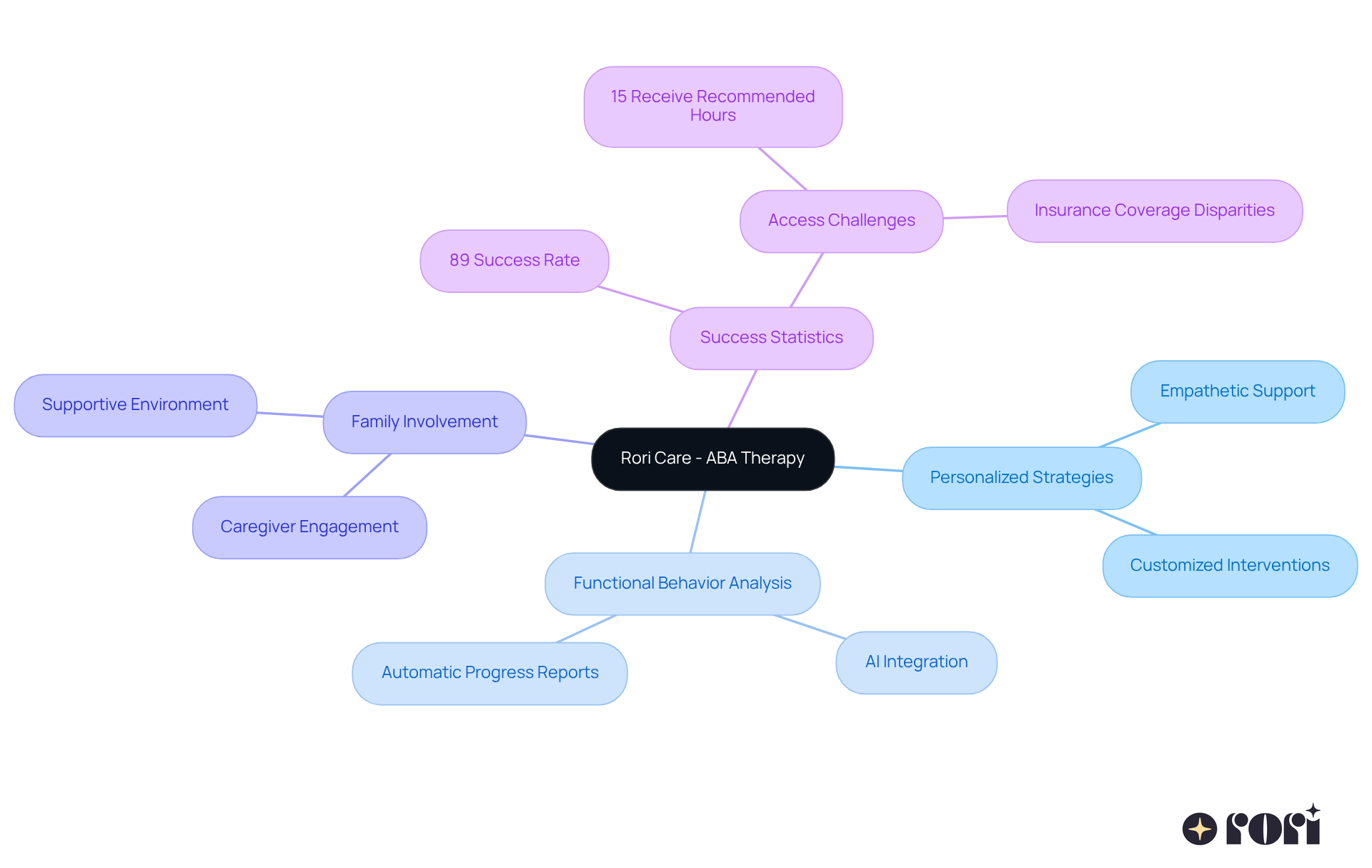
Understanding the unique perspective of an autistic child is so important for providing effective guidance. Kids on the autism spectrum often see things differently, which can greatly affect their response to autism and discipline. By actively listening and observing their responses, you can gain valuable insights into their thought processes. This understanding helps you adjust your approach to fit their emotional state and comprehension, ultimately making your guidance more effective.
As Dr. Supatra Tovar points out, recognizing that a child’s behavior has a reason is key. This perspective paves the way for a more positive approach to guidance. When you focus on connection and understanding, you create an environment where guidance is about teaching and supporting growth, not just correction.
Plus, by continuously assessing and adjusting your methods of discipline, you can adapt your strategies based on your child’s development and reactions, especially in the context of autism and discipline. Setting clear goals and using evidence-based methods can really help create a supportive atmosphere that meets your child’s developmental needs. Establishing consistent routines can provide the structure that autistic kids thrive in, making it easier for them to understand what’s expected of them.
By embracing ABA principles, you can boost your effectiveness in supporting your child’s behavioral goals. Let’s explore this together! Remember, you’re not alone on this journey, and we’re here to help you every step of the way!
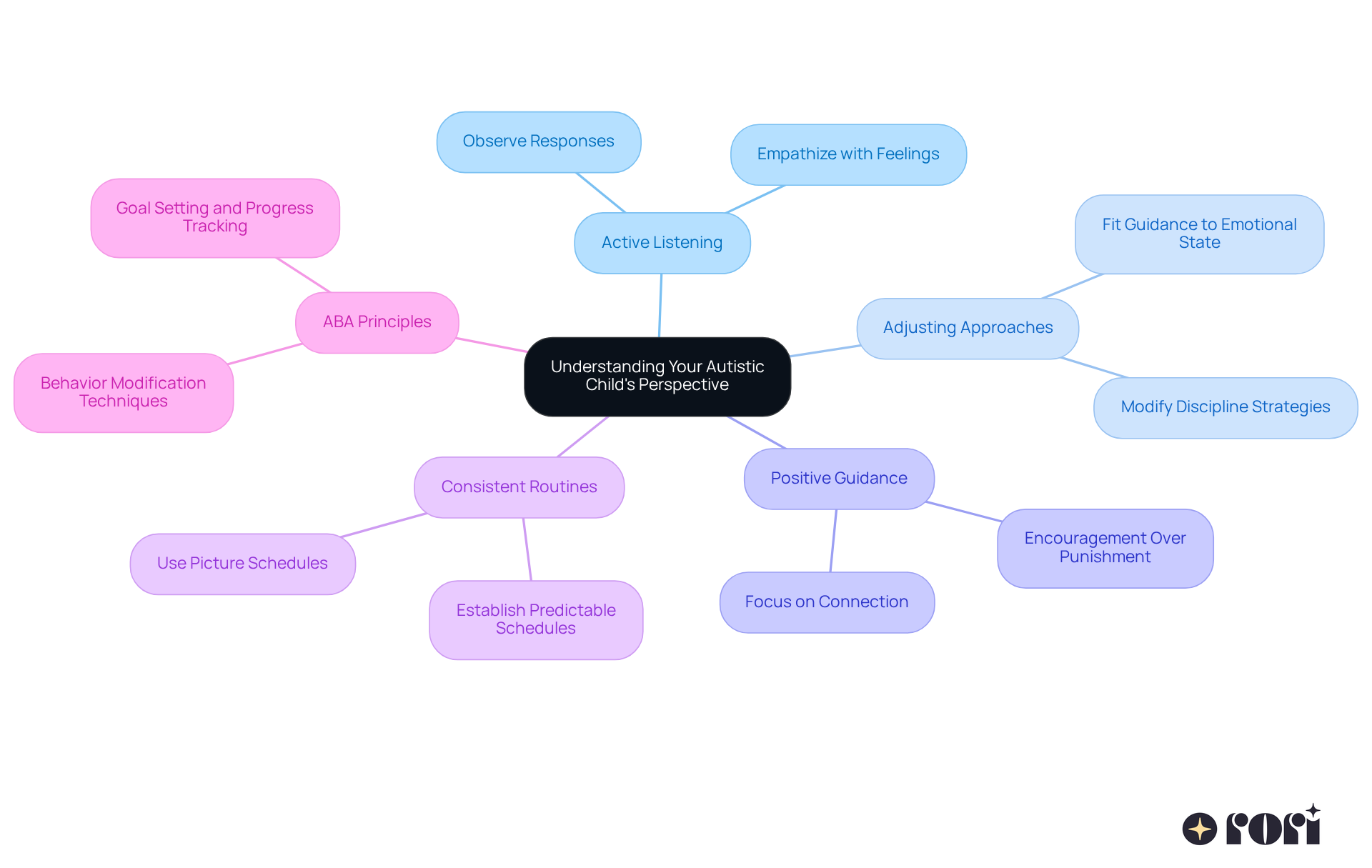
Creating a consistent atmosphere is essential for effective management in youngsters with autism and discipline, and this is where Applied Behavior Analysis (ABA) truly shines. ABA is a tailored therapy that adjusts to your child's unique needs, using the science of learning and behavior. Consistent routines and clear guidelines help kids understand what’s expected of them, easing anxiety and enhancing their ability to respond positively to methods of autism and discipline.
Research shows that structured environments—think visual schedules and timers—can significantly improve behavior by providing clarity and reducing feelings of overwhelm. For instance, young individuals who engage with visual schedules often display better compliance and understanding of transitions, leading to smoother daily routines. By embracing ABA principles, parents can craft personalized plans with measurable goals and evidence-based strategies that empower their children.
And let’s not forget, ABA isn’t just beneficial for those with autism; it also supports kids with ADHD, learning disabilities, and other behavioral challenges. As Temple Grandin wisely said, "Different, not less," reminding us of the importance of understanding and supporting children with autism. By fostering predictability through ABA techniques, parents can create a nurturing environment that not only guides their children in relation to autism and discipline but also enhances their overall well-being and independence.
Let’s explore this together! With the right support and strategies, we can make a significant difference in the lives of our kids.

Effective discipline really hinges on clear and consistent communication. Using simple language along with visual aids can make a big difference in how we convey rules and expectations. Research shows that visual aids help enhance understanding, making it easier for young individuals to grasp disciplinary measures. Consistency is key here; if a young person hears that a specific action is unacceptable, it’s essential to address that action the same way every time it happens. This approach not only reinforces understanding but also helps with compliance.
For instance, when young individuals consistently see visual prompts of expected behaviors, they’re better prepared to understand the consequences of their actions. This ultimately boosts the effectiveness of discipline. Plus, research indicates that visual aids can create a more organized environment, which can alleviate stress and uncertainty—common challenges for individuals with autism and discipline.
Additionally, Applied Behavior Analysis (ABA) therapy adapts to each individual’s unique needs, making it a personalized approach to behavioral intervention. Early Intensive Behavioral Intervention (EIBI) is particularly important as it can greatly enhance learning, verbal, and social skills in children with a focus on autism and discipline. Did you know that the demand for certified ABA therapists has skyrocketed by 5,852% from 2010 to 2021? This highlights the growing recognition of effective methods in the care of autism and discipline.
By equipping caregivers with ABA concepts and techniques, we can create an atmosphere that encourages learning and positive actions. Let’s explore this together! We’re here to help you every step of the way!
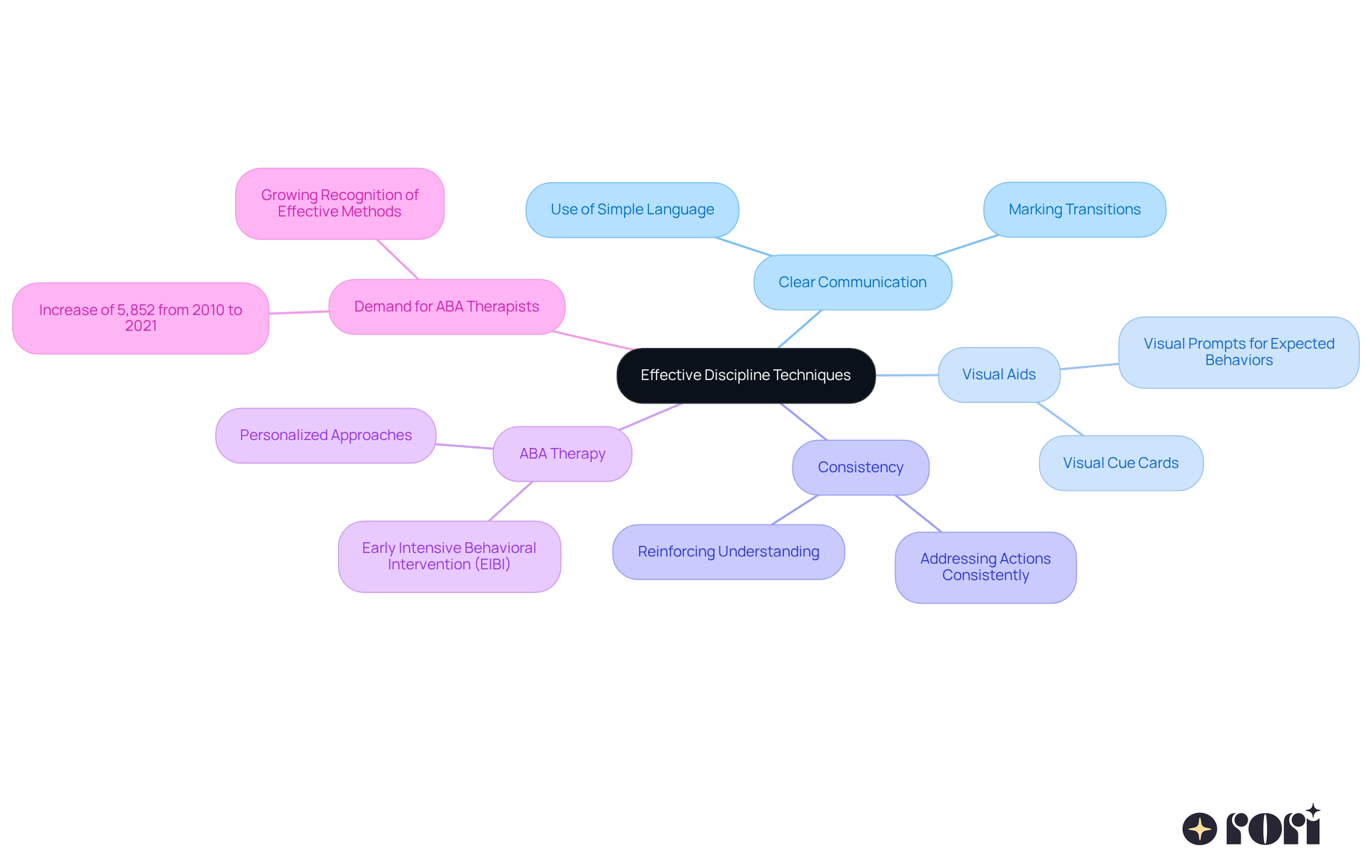
Instructing 'no' through positive reinforcement is actually a more effective approach than relying solely on punishment for unwanted actions. When a young person respects a boundary, it's so important to recognize and reward that behavior! This not only strengthens the desired action but also helps the young person understand why boundaries matter. For example, if a young person successfully avoids an unwanted action, giving them a compliment can really encourage them to keep sticking to those boundaries.
Research shows that immediate recognition of positive behavior boosts motivation and reinforces desired actions. This creates a supportive environment that reduces anxiety and promotes positive behavior. By setting clear, youth-friendly boundaries and consistently rewarding adherence, parents can foster a sense of security and understanding in their kids. This ultimately leads to more effective strategies for discipline in the context of autism and discipline.
Plus, when caregivers learn about ABA principles, they gain the knowledge and skills to make informed decisions that positively impact their children's progress. This active involvement not only enhances behavioral outcomes but also empowers caregivers, reducing stress and improving overall family dynamics. As Dr. Temple Grandin wisely states, 'Different, not less,' reminding us that every individual deserves understanding and support in their development. Let’s explore this together!

Creating a supportive atmosphere is essential for effective management in kids with autism and discipline. 🌟 A calm environment that reduces excessive stimuli promotes a feeling of security and encourages constructive involvement with management techniques. You can achieve this by:
Research shows that sensory-friendly environments greatly improve young people's ability to regulate their emotions and actions. When children feel safe and at ease, particularly regarding autism and discipline, they’re less likely to display difficult behaviors, allowing caregivers to apply guidance techniques more effectively.
Utilizing sensory tools, like weighted blankets or fidget devices, can further support emotional regulation, helping children thrive in a structured environment. By prioritizing these elements, caregivers can create a nurturing atmosphere that promotes cooperation and reduces anxiety during those tricky moments involving autism and discipline. Let’s explore this together and see how these small changes can make a big difference! 💖
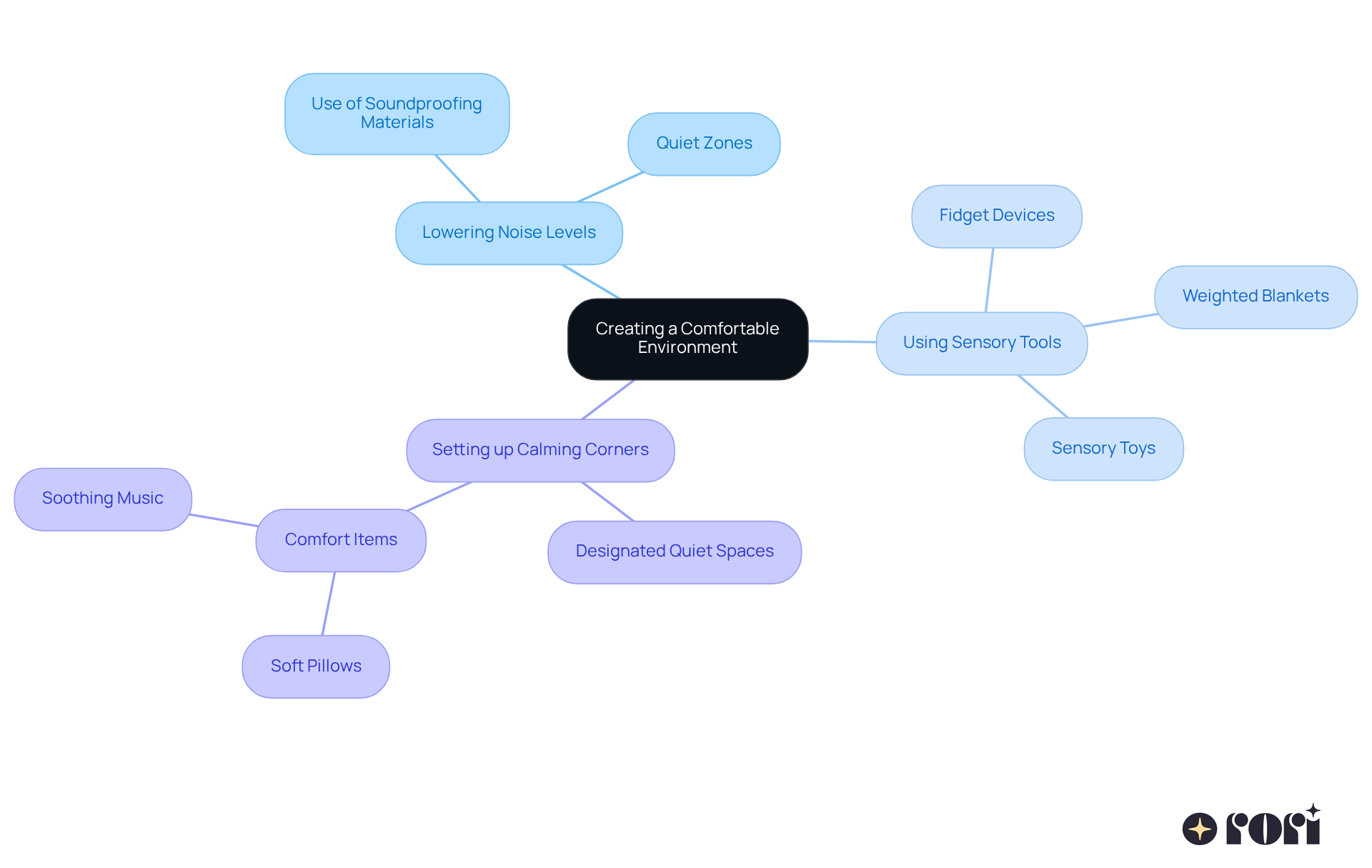
Practicing acceptance is so important for finding that balance between self-control and understanding. Children with autism and discipline often encounter unique challenges that can lead to certain behaviors. Instead of reacting with frustration, it's helpful for caregivers to approach autism and discipline with empathy and patience. Remember, setbacks are just part of the learning journey! This kind of compassionate response not only helps in managing difficult behaviors but also creates a nurturing environment where kids feel valued and understood.
By taking the time to understand the reasons behind their actions, caregivers can implement strategies like consistent rules and visual aids to address autism and discipline. These tools can really encourage positive behavior while boosting a child's self-esteem and emotional well-being. Plus, when caregivers are equipped with ABA concepts and techniques that address autism and discipline, they can make informed choices that positively impact their child's development, leading to better behavioral outcomes.
It's crucial to remember that severe punishment can harm a young person's self-worth. That's why adopting a compassionate approach is key—it empowers caregivers and enhances their ability to support their child's developmental goals. Let’s explore this together! We’re here to help you every step of the way!
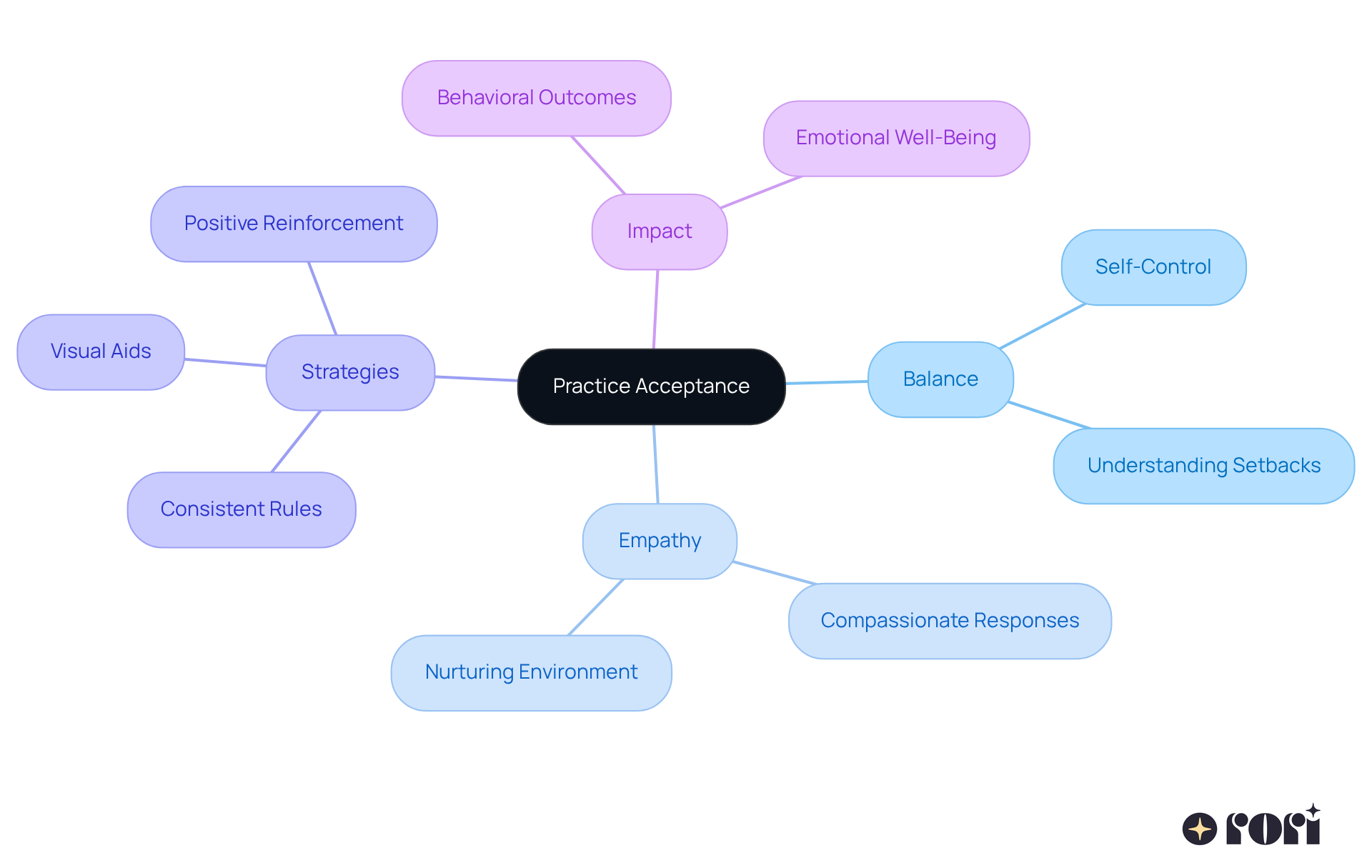
Implementing effective strategies for autism and discipline involves experimentation and observation. Every child is unique, and what works wonders for one may not resonate with another. For instance, some kids might respond well to visual signals like charts or schedules, while others may thrive on verbal prompts or hands-on activities. By tailoring behavior management methods to suit your child’s unique traits, you can significantly enhance the effectiveness of your approach.
Research shows that personalized strategies not only promote positive changes but also nurture a sense of achievement and responsibility in young individuals. Think about using positive reinforcement to celebrate good behavior; it can really boost self-esteem and clarify what’s expected. Plus, having structured routines can provide predictability, which helps reduce anxiety and makes transitions smoother for your little ones.
Ultimately, the key is in understanding your child’s specific needs regarding autism and discipline and being ready to adapt your methods accordingly. Let’s explore this together! Remember, you’re not alone in this journey; we’re here to help you every step of the way!
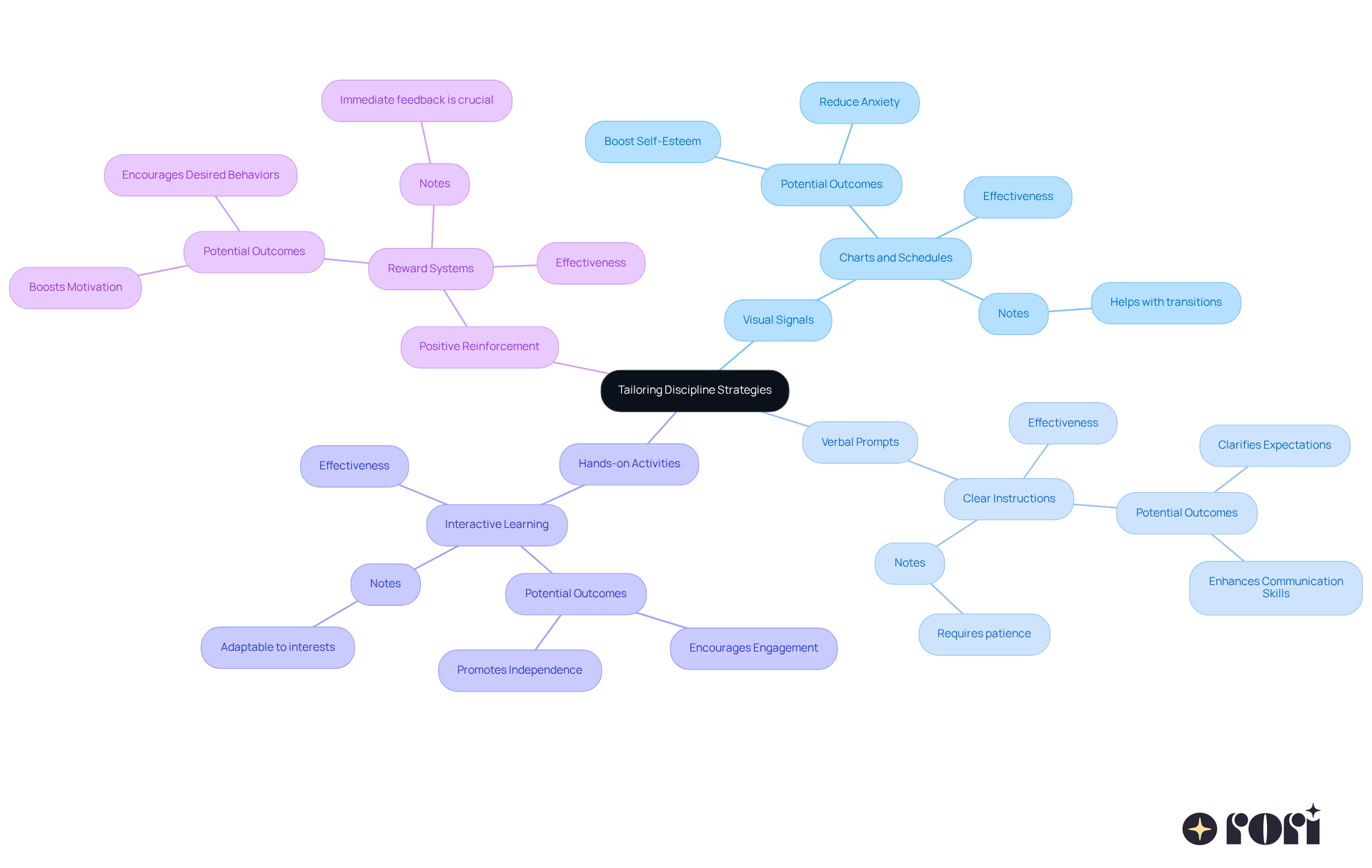
Managing parental stress is so important for improving behavior control! Caregivers, remember to prioritize self-care and don’t hesitate to seek support when you need it. Engaging in stress-reducing activities like:
can really help you maintain a positive mindset.
Plus, learning about ABA principles can empower you with the knowledge and strategies necessary to support your child's behavioral goals related to autism and discipline. This understanding not only boosts your confidence but also encourages consistency in how you apply these techniques. When you feel less anxious and more informed, you’re better equipped to implement these approaches effectively. This can lead to wonderful behavioral improvements for your children. Let’s explore this together!
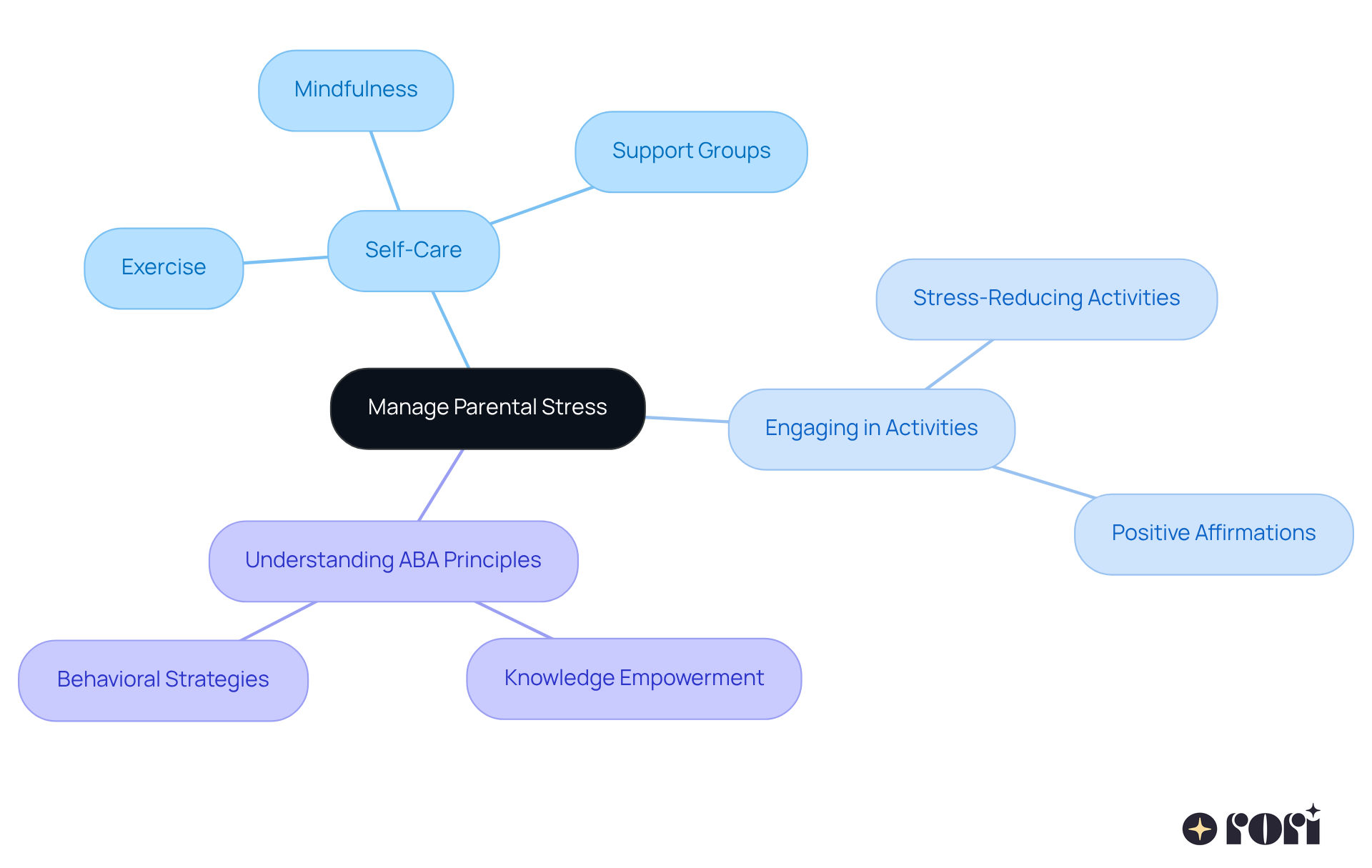
Interacting with experts like Board Certified Behavior Analysts (BCBAs) or therapists can really make a difference in how we manage the needs of autistic individuals. These professionals provide tailored advice and support, drawing from their rich experience with similar cases. Regular chats not only keep caregivers in the loop about best practices and new techniques but also ensure that our discipline approaches are effective and adaptable to our little ones' changing needs.
Data shows that consultations with BCBAs can lead to better behavior management. Many families have shared their success stories when they’ve implemented strategies recommended by these experts. By tapping into their knowledge, we can create a more supportive and effective environment for our children. Let’s explore this together and see how we can make a positive impact!
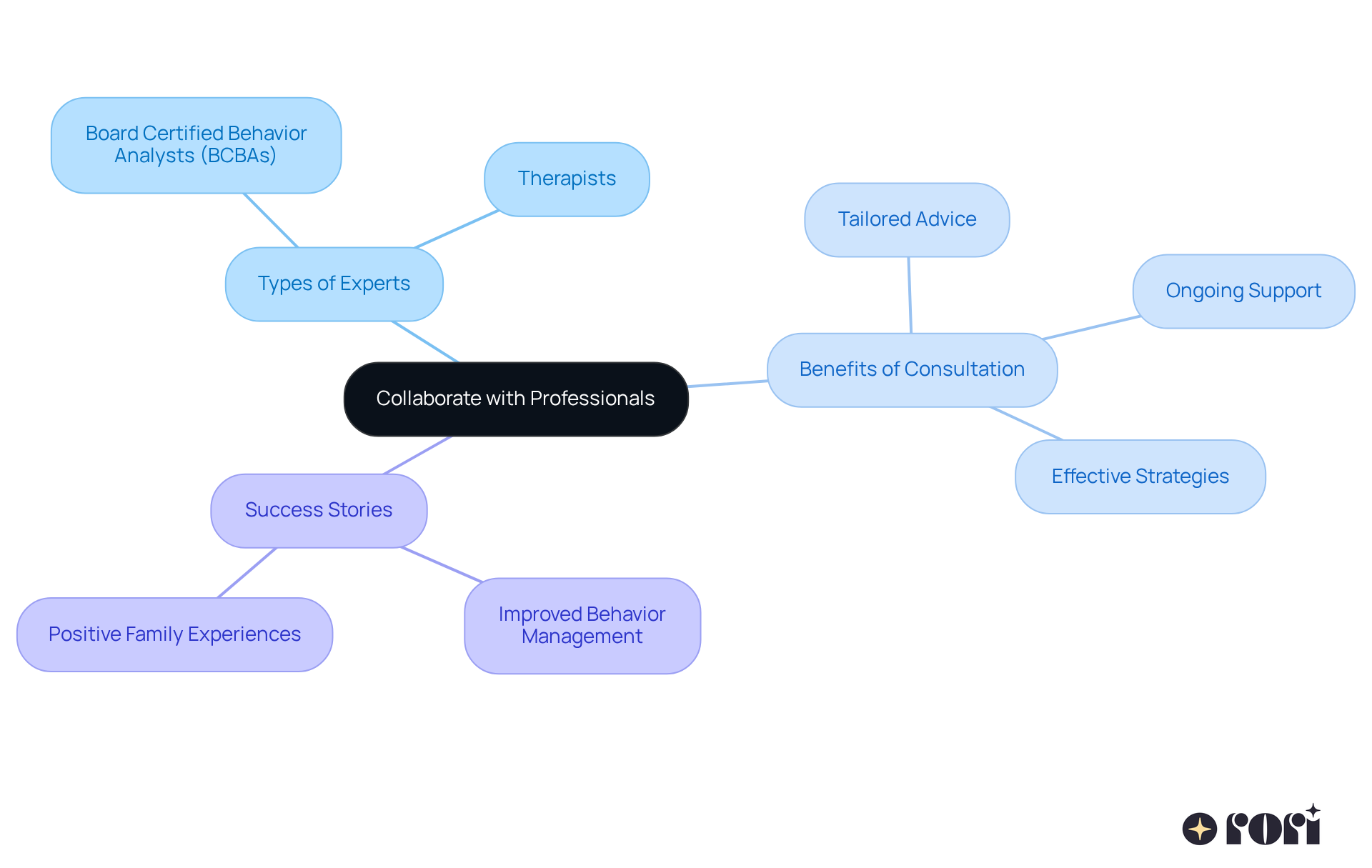
Understanding and implementing effective strategies for autism discipline at home is so important for nurturing positive behavior and development. By focusing on personalized approaches, caregivers can create a supportive environment that truly caters to the unique needs of each child. This journey highlights the significance of empathy, clear communication, and structured routines, all essential in guiding children toward their behavioral goals.
Throughout this discussion, we see key insights that emphasize:
The role of ABA therapy is particularly important, illustrating how tailored interventions can lead to remarkable improvements in behavior when caregivers are actively involved. Plus, managing parental stress and collaborating with professionals can really enhance the effectiveness of discipline strategies, ensuring families receive the support they need.
Ultimately, the message is clear: effective discipline for autistic children requires a compassionate and adaptive approach. By embracing these strategies, caregivers can not only improve their child's behavior but also foster a nurturing environment that promotes growth and understanding. Remember, support is available, and by working together, families can create a positive impact that resonates far beyond the home. Let’s explore this journey together!
What is Rori Care's approach to ABA therapy for children with autism?
Rori Care utilizes Applied Behavior Analysis (ABA) therapy to create personalized strategies tailored to the unique needs of each child. Clinicians provide extensive support by evaluating individual actions and triggers to design customized interventions that promote positive changes.
How does Rori Care leverage technology in its therapy approach?
Rori Care employs an innovative behavior care engine that conducts functional behavior analysis for target behaviors and skills, generating automatic progress reports for clinician review. This integration of advanced AI technology allows clinicians to free up 50% more time for student treatment.
What are the success rates of personalized treatment plans in ABA therapy?
Research indicates that personalized treatment plans can significantly enhance the quality of life for individuals with autism and discipline, with success rates often exceeding 89% when caregivers are actively involved.
What challenges do families face in accessing ABA therapy?
Only 15% of insured youngsters referred for ABA treatment receive 80% or more of the recommended treatment hours, highlighting significant challenges that families encounter in accessing effective therapy.
Why is understanding an autistic child's perspective important for discipline?
Understanding the unique perspective of an autistic child is crucial for providing effective guidance. By actively listening and observing their responses, caregivers can adjust their approach to fit the child's emotional state and comprehension, making guidance more effective.
How can caregivers create a supportive environment for their autistic child?
Caregivers can create a supportive environment by focusing on connection and understanding, continuously assessing and adjusting their methods of discipline, setting clear goals, and establishing consistent routines that provide the structure autistic children thrive in.
What role does ABA play in establishing predictability for children with autism?
ABA helps create a consistent atmosphere essential for effective management by adjusting to the child’s unique needs. Consistent routines and clear guidelines ease anxiety and enhance the child’s ability to respond positively to discipline methods.
What strategies can parents use to improve behavior in autistic children?
Parents can use structured environments, such as visual schedules and timers, to provide clarity and reduce feelings of overwhelm, which can significantly improve behavior and compliance.
Is ABA therapy beneficial only for children with autism?
No, ABA therapy is beneficial for children with various behavioral challenges, including those with ADHD and learning disabilities, by providing tailored support and strategies.
How can parents foster predictability and support their child's independence?
By embracing ABA techniques and creating a nurturing environment through predictability, parents can guide their children in relation to autism and discipline while enhancing their overall well-being and independence.